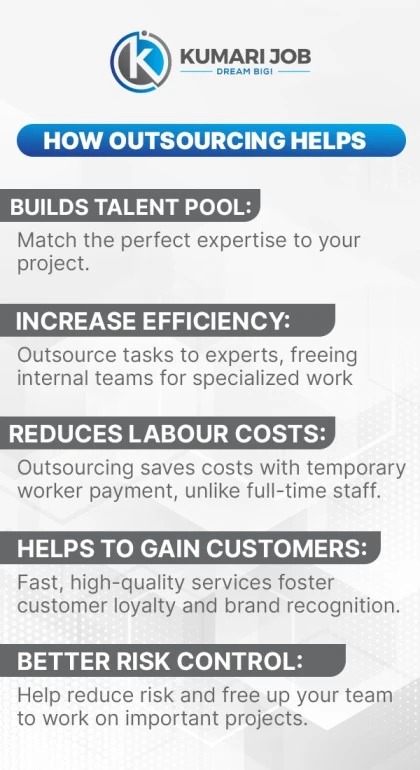
Introduction
Outsourcing is a business practice in which a company hires a third party to perform tasks, handle operations, or provide services for the company. In 1989, it was first recognised as a business strategy, and later, in the 1990s, it became a fundamental part of the business.
According to the definition of outsourcing, it is the technique of appointing another firm or company for a specific task. To simplify, we can say that it is a business practice to assign a particular third party to provide services previously done by the company’s staff. The purpose of doing so is to cut costs and increase the company’s profitability. It also involves the distribution of labour so that the company can focus on more important subjects.
Multinational enterprises outsource in Nepal due to lower labour costs than in India, Pakistan, and other South Asian countries. Many companies have extended their business and created a niche market for their products and services in Nepal, leveraging the growing demand and low operation costs
In this blog
Examples of Outsourcing
Many companies outsource virtually all administrative tasks, such as database administration or invoicing, to other developing nations.
A small company may decide to outsource bookkeeping duties to an accounting firm, as doing so may be cheaper than retaining an in-house accountant. Other companies find outsourcing the functions of human resource departments, such as payroll and health insurance, beneficial. Outsourcing is an effective strategy to reduce expenses and can give a business a competitive advantage.
Apple: The renowned company Apple outsources most of the production of its iPhones to many other firms. A firm named Foxconn is supposed to manufacture the final iPhone. Moreover, Apple also outsources several products, such as mobile DRAM, from Samsung.
Apple can focus on more important things by outsourcing basic tasks, such as developing new software and designs to compete with competitors.
Common Types of Outsourced Work:
Outsourcing work depends heavily on the needs of the business and the industry it operates in. The most commonly outsourced activities include content writing, customer support service, Marketing, supply chain management, human resource management, engineering, research and design, computer programming services, tax compliance, etc.
- Benefits administration
- Recruitment and onboarding
- Payroll and tax administration
- Compliance and Risk Management
- Policy creation and workplace safety
- Employee Training and development
Benefits of Outsourcing
Overview of its Significance in Modern Business Practices:
- Cost Efficiency: Outsourcing enables businesses to reduce operational costs significantly by leveraging the expertise and economies of scale offered by external service providers.
- Access to Specialized Skills: Organisations can access high-quality services without requiring extensive training or hiring additional staff by outsourcing specific tasks to professionals with expertise.
- Focus on Core Competencies: Outsourcing allows companies to concentrate their resources and efforts on core business functions, such as product development, marketing, and strategic planning, while leaving peripheral tasks to external specialists.
- Globalisation and Market Expansion: Outsourcing facilitates access to a global talent pool, enabling businesses to tap into diverse skill sets and expand their presence in new markets with minimal upfront investment.
- Flexibility and Scalability: Outsourcing offers businesses the flexibility to scale their operations up or down quickly in response to changing market demands without the constraints of fixed overheads associated with in-house operations.
Role of HR Outsourcing Company
Human resource outsourcing is a business model where a third party manages HR on behalf of another, allowing the latter to concentrate on growth-related goals. An HR outsourcing company is crucial in supporting businesses by managing various aspects of their human resources and functions. Here's an overview of their critical roles and responsibilities:
- Recruitment and Staffing: HR outsourcing firms assist businesses in sourcing, screening, and hiring qualified candidates for vacant positions. They manage the entire recruitment process, from posting job advertisements to conducting interviews and background checks, helping companies find the right talent efficiently.
- Employee Onboarding and Training: Once employees are recruited with the help of employee outsourcing, HR outsourcing companies facilitate the onboarding process by handling paperwork, orientation sessions, and training programs. They ensure that employees receive the necessary resources and information to integrate seamlessly into the organisation.
- Payroll Administration: Managing employee payroll can be complex and time-consuming are for businesses. HR outsourcing companies streamline this process by calculating employee salaries, processing payroll taxes, and ensuring timely payment of wages. They also handle deductions, reimbursements, and compliance with labour laws and regulations.
- Benefits Administration: From health insurance and retirement plans to leave management and employee assistance programs, HR outsourcing firms oversee various employee benefits. They administer benefit plans, communicate changes to employees, and resolve benefits enrollment and claims processing issues.
- HR Compliance and Risk Management: Staying compliant with employment laws and regulations is crucial for businesses to avoid legal liabilities. HR outsourcing companies stay abreast of changing legislation and ensure businesses adhere to labour laws, workplace safety regulations, and other statutory requirements. They also guide mitigating risks associated with employee relations and workforce management.
What services does HRO typically offer?Some well-known outsourcing companies in Nepal that offer business process outsourcing services are Young Minds Nepal, Leapfrog Technology, and Braindigit. Most of these firms work for international IT firms. HR outsourcing companies generally have dedicated service teams that deliver day-to-day support in the following areas:
Benefits of Outsourcing Payroll Services
Outsourcing payroll services offers numerous advantages for businesses of all sizes. Here are some key benefits:
1. Cost Savings: Outsourcing payroll eliminates the need to hire dedicated staff and invest in payroll software and infrastructure. Businesses can reduce overhead costs associated with payroll processing by paying a fixed fee to an outsourcing provider.
2. Time Efficiency: Managing payroll in-house can be time-consuming, requiring significant resources and attention to detail. Outsourcing payroll services frees up valuable time for business owners and HR staff, allowing them to focus on core business activities and strategic initiatives.
3. Accuracy and Compliance: Payroll processing involves complex calculations, tax deductions, and compliance with labor laws and regulations. Outsourcing payroll to experienced professionals reduces the risk of errors and ensures compliance with tax laws, wage regulations, and reporting requirements.
4. Access to Expertise: Payroll outsourcing providers have specialised knowledge and expertise in payroll processing, tax administration, and regulatory compliance. They stay updated on tax and labour regulation changes, ensuring accuracy and adherence to legal requirements.
5. Enhanced Security: Outsourcing payroll services can enhance data security and confidentiality. Reputable outsourcing providers implement robust security measures and encryption protocols to protect sensitive payroll information from unauthorised access and cyber threats.
6. Scalability and Flexibility: Outsourcing payroll services offers scalability to accommodate business growth or fluctuations in workforce size. Whether a business expands its operations or downsizes its workforce, outsourcing providers can adjust payroll services accordingly, providing flexibility to meet changing needs.
7. Reduced Administrative Burden: Managing payroll internally involves administrative tasks such as processing payroll checks, issuing direct deposits, and preparing tax forms. Outsourcing payroll services streamlines these processes, reducing administrative burdens for business owners and HR staff.
8. Employee Satisfaction: Timely and accurate payroll processing improves employee satisfaction and morale. Outsourcing payroll ensures employees receive their wages on time and accurately, enhancing trust and loyalty towards the organisation.
9. Focus on Core Business Activities: By outsourcing payroll services, businesses can redirect their resources and efforts towards core business activities, such as sales, marketing, and product development. This enables businesses to maximise productivity and profitability while leaving payroll administration to experts.
Outsourcing payroll services offers cost savings, time efficiency, accuracy, compliance, and access to expertise, allowing businesses to streamline payroll processes and focus on strategic growth initiatives.
Enhancing Business Efficiency with Outsourcing
Outsourcing is a crucial business strategy to streamline operations, optimise resources, and enhance efficiency.
1. Focus on Core Activities: Outsourcing non-core tasks allows businesses to focus on core activities that directly contribute to growth and profitability, allowing them to allocate resources towards strategic initiatives and revenue-generating activities.
2. Access to Specialized Expertise: Outsourcing offers businesses specialised skills and expertise, such as software development, digital marketing, and accounting services, enabling them to execute projects more efficiently and deliver higher-quality results.
3. Cost Savings: Outsourcing can significantly reduce business costs, especially labor and infrastructure expenses. By outsourcing tasks to regions with lower labour costs or using shared resources, organisations can reduce overhead and operational expenses, eliminating upfront investments in infrastructure, technology, and training.
4. Improved Scalability and Flexibility: Outsourcing allows businesses to quickly adjust their operations to changing market conditions or needs. It allows them to adapt their workforce and resources without fixed overheads, ensuring agility and responsiveness in dynamic market environments.
5. Enhanced Productivity and Time Management: Outsourcing routine tasks enhances productivity, time management, and efficiency, freeing up internal resources for high-value activities, reducing administrative burdens, and promoting faster turnaround times and project delivery.
6. Risk Mitigation: Outsourcing helps businesses mitigate risks like compliance, security, and continuity by ensuring industry regulations, robust security measures, and workforce management risks. It also offers access to a diverse talent pool and contingency plans.
Outsourcing enhances business efficiency by focusing on core activities, accessing specialised expertise, cost savings, scalability, productivity improvements, and risk mitigation, driving growth and gaining a competitive edge.
Conclusion
Outsourcing is a strategic business approach to improve efficiency, reduce costs, and drive growth in a competitive environment. It involves delegating non-core tasks to external service providers, allowing them to focus on core activities. Outsourcing is crucial for businesses to boost efficiency and growth in today's competitive environment. It will enable enterprises to delegate non-core tasks to external service providers, allowing them to focus on core activities, access specialised expertise, and realise cost savings.
Outsourcing helps businesses mitigate risks, comply with regulations, and adapt to market changes by leveraging global talent pools, streamlining operations, maximising efficiency, and achieving strategic objectives. In the digital age, outsourcing is crucial for businesses to remain agile, competitive, and resilient. It unlocks growth opportunities, drives innovation, and helps companies thrive in a dynamic business environment.
For more Career tips, visit: https://www.kumarijob.com/careertip
Frequently Asked Questions
Outsourcing allows companies to focus on critical tasks and is cost-effective. It's essential for successful businesses, like restaurant owners who need IT expert help with app or website creation.
Computer companies were the first to start it.
Some of the disadvantages of outsourcing are as follows:
- Lack of communication
- Delay of the project
- No complete control over the third-party actions
- Language and time zone barriers
Types of outsourcing are
- Process-specific outsourcing
- Professional outsourcing
- Logistics outsourcing
- Operational outsourcing
- Manufacturing outsourcing
- Project outsourcing
- Multi-sourcing
Office and warehouse cleaning, advertising, and website development are the top outsourcing examples in the global business industry.
Business Process Outsourcing
Business Process Outsourcing (BPO) involves hiring another business to perform specific tasks, such as customer service, data entry, telemarketing, and claims processing.













Loading Comments...